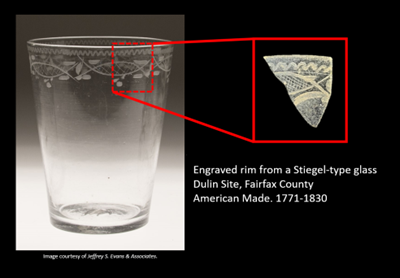By Heather Hembrey, M.A., M.A.A.
The Fairfax County Park Authority’s archaeological collections are home to upwards of three million artifacts. THREE MILLION artifacts? Yes! Over 33,000 artifacts came from the Dulin site, located in the Holmes Run area. People living there as long as 8,000 years ago left a side-notched Archaic projectile point. Jumping ahead to 1765, Edward Dulin established a farm in the same location, where his descendants lived until 1887. The Dulins also left artifacts.
Between 1979 and 1989, archaeologists working around the Dulin site’s main house, brick foundations, cobbled walkways, icehouse, root cellar, and barn complex recovered thousands of artifacts. Among them was this early-period American cut glass rim shard from a copper-engraved drinking glass.

Sometime between 1771 and 1830, an artisan used rotating copper wheels to engrave this glass’s intricate designs. The glass may have been crafted at the Stiegel or Amelung glassworks. German immigrant Henry William Stiegel operated his glassworks in Manheim, Pennsylvania from 1763 to 1774. His advertisement in the September 5, 1771 Alexandria Gazette announced, “American Flint Glass is now made at the factory in Manheim, in Lancaster County, Equal in quality to any imported from Europe”. Between 1785 and 1795 John Frederick Amelung produced such glassware at his New Bremen Glass Manufactory near Frederick, Maryland. Stiegel, Amelung, and other American artisans sought to replicate the thin-walled, intricately engraved glass style popular in Europe at that time. Such glassware is often referred to as Stiegel type.
Edward Dulin’s son John may have purchased this glass before his death in 1855. John Dulin was a prominent and somewhat affluent Fairfax County resident. No known inventory of John Dulin’s goods exists, so whether he owned glassware cannot be determined. We do know that someone at the Dulin site once used and likely broke this glass, leaving behind this delicate shard for us to admire.


